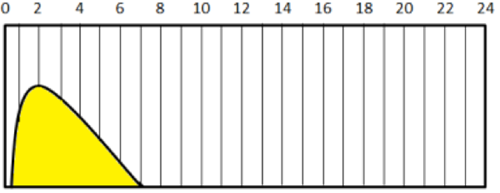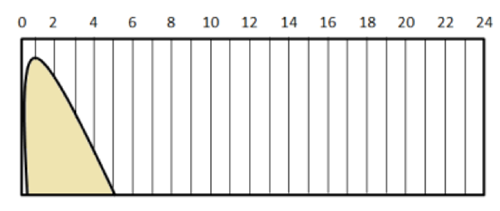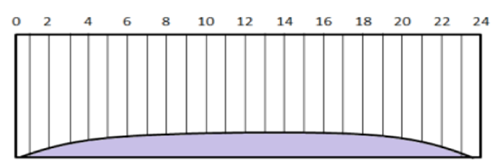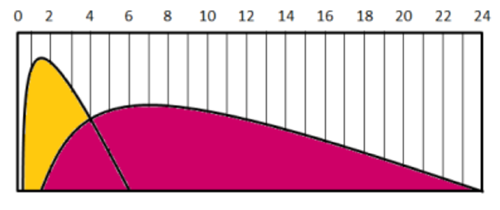Insulin
The following will give you information on the different types of insulin you may be prescribed for your diabetes. The graphs all show the action of the insulin against the number of hours that have passed since it was injected.
Quick-acting insulin
Quick-acting insulin is usually taken before meals. There are two different types of quick-acting insulin, both of which are clear in appearance:
- Soluble – this type of insulin comes from human or animal insulin-producing cells
- Analogue – this is a newer type of insulin that is synthetic and is produced in a lab
Quick-acting soluble insulin
The following are the different types of soluble insulin you may be prescribed.
- Actrapid
- Humulin S
- Hypurin Porcine Neutral
- Insuman Rapid

After the insulin has been injected it is absorbed into your bloodstream and starts to work within 30 minutes, peaking between 2 and 4 hours after injection and lasting for up to 8 hours. You normally inject these types of insulin 20–30 minutes before you have your main meal.
Quick-acting analogue insulin
The following are the different types of quick-acting analogue insulin you may be prescribed.
- Humalog
- Novorapid
- Apidra

This may be prescribed instead of soluble insulin as it acts more quickly and disappears from your system more quickly, reducing the risk of you having a hypoglycaemic episode (a ‘hypo’) after your meal when you have already digested your food.
It should ideally be injected 10–15 minutes before meals. It begins to work within 15 minutes, peaking between 50 and 90 minutes after injection. It can continue to have an effect on blood glucose for 2 to 5 hours, depending on the dose injected.
There are now also some ultra fast acting analogue insulins. These are administered 5 mins before a meal and last 2-3 hours. They can also be injected after a meal, though this is not recommended. These include
- FiAsp
- Lyumjev
Long-acting insulin
Isophane insulin
The following are the different types of isophane insulin you may be prescribed.
- Insulatard
- Humulin I
- Hypurin Porcine Isophane
- Insuman Basal

Isophane insulins are cloudy in appearance, and you need to mix them before you inject them. These insulins are often taken twice daily – in the morning and again at bedtime, although some people only need to take them once a day. They begin to work 2 hours after injection, peaking between 4 and 6 hours after injection. They continue to have an effect on blood glucose for 8 to 14 hours.
Long-acting analogue insulin
The following are the different types of long-acting analogue insulin you may be prescribed.
- Levemir (can be taken once or twice daily) - this is being discontinued in 2026

- Lantus (usually taken once a day, sometimes twice a day)
- Toujeo - taken once daily
- Abasaglar - taken once daily
- Tresiba - taken once daily

Long-acting analogue insulins are clear in colour, can be used instead of isophane insulins and last longer. They begin to work 2 hours after injection and last for 18–24 hours.
Mixed insulins
These insulins are a mixture of quick-acting and longer-acting insulins and come in various proportions.

Mixed human insulin
The following are the different types of mixed human insulin you may be prescribed.
- Humulin M3
- Insuman Comb 15
- Insuman Comb 25
- Insuman Comb 50
They are usually taken twice daily and injected approximately 30 minutes before breakfast and the evening meal.
Mixed analogue insulin
The following are the different types of mixed analogue insulin you may be prescribed.
- Novomix 30
- Humalog mix 50
- Humalog mix 25
Mixed analogue insulin has a quicker action. This type of insulin is usually taken twice daily (although Humalog mix 50 may be taken three times daily if recommended by your diabetes care team) and injected 5 to 15 minutes before eating. Some people, however, prefer to take this type of insulin with or after food.
Useful resources
For information on how to inject insulin, see Injecting Insulin.
For further reading, have a look at Diabetes UK information on insulin.